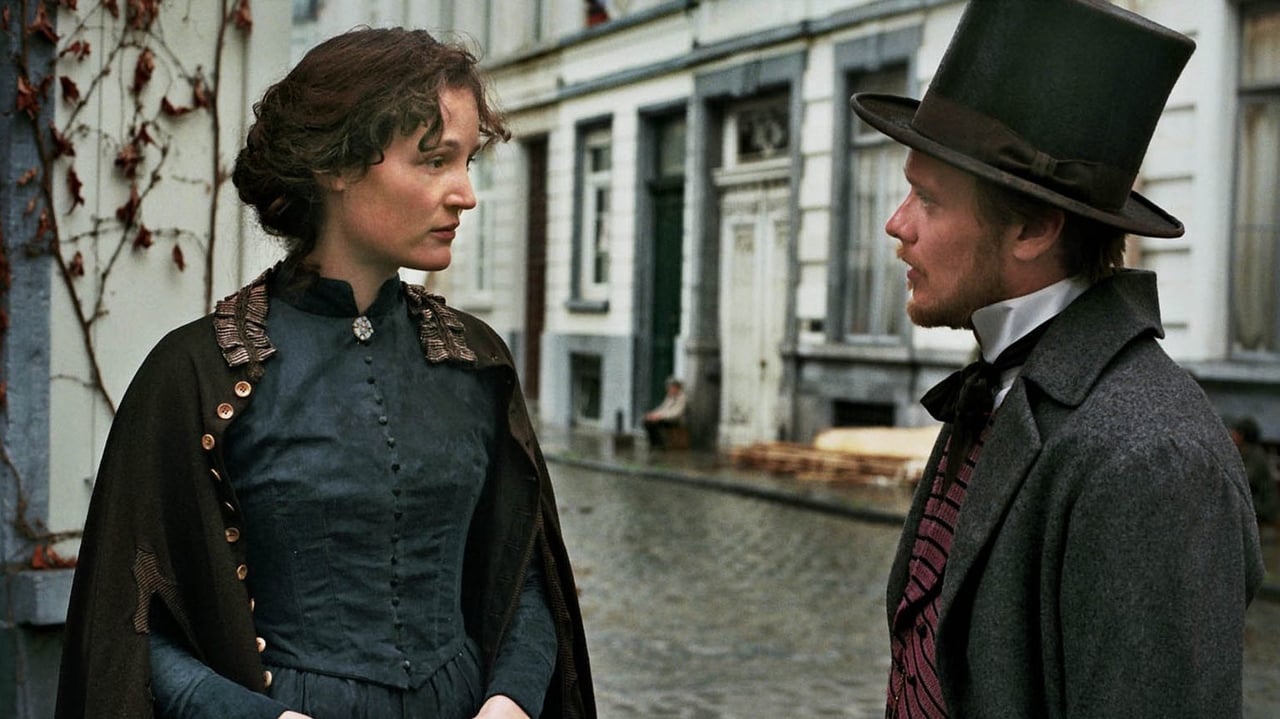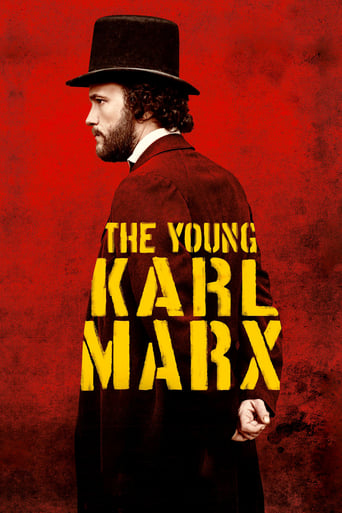



This movie was so-so. It had it's moments, but wasn't the greatest.
View Moreif their story seems completely bonkers, almost like a feverish work of fiction, you ain't heard nothing yet.
View MoreThe movie turns out to be a little better than the average. Starting from a romantic formula often seen in the cinema, it ends in the most predictable (and somewhat bland) way.
View MoreThe movie really just wants to entertain people.
A wonderful antidote to the disastrous In Dubious Battle and a worthy backdrop to the ongoing proletarian revolution coming soon to a screen near you....
View MorePeck's film follows appealingly prickly young Marx and Engels from their early insistence on the hard truths of class-conflict against the utopian socialists of their day, to the founding of the first workers' international with a program of anti-capitalist struggle, the Communist Manifesto. Only a profit-system triumphalist would resist cheering them on along with the galvanized, wretched workers of 1848. The contrasting constraints on their activist mates, the high-born Jenny Marx and worker Mary Burns, raise still-pressing issues, and the situation of Engels, the revolutionary intellectual who must finance the cause by working for the enemy, may resonate with professionals today. But the movie, concluding with a montage of wars and protests churned up by the profit system in the present, feels frustrating and incomplete - inevitably so. It doesn't show the collective hero of Marx and Engels' vision, the world working class. This class, that produces all, is now ever more interlinked and technically advanced. But its political development hasn't caught up with material conditions that never existed in previous challenges to capitalism. The decisive fight against the old system for humanity's future has yet to be waged, its film still to be made. R. Freed
View MoreSix years ago I stumbled upon a Charlie Rose interview with author Mary Gabriel, a 2011 National Book Award finalist for her Love and Capital: Karl and Jenny Marx and the Birth of a Revolution. Intrigued, I ordered Gabriel's book. By the time I finished Love and Capital I was, as the British say, "gob smacked." What puzzled and surprised me, as a filmmaker, was that this turbulent epic, utterly engrossing and deeply romantic, had attracted so little attention. Why had this story not made it to the big screen, or materialized into a blockbuster television series? Is the name Karl Marx still so anathema? Then, last Sunday, a new film titled The Young Karl Marx (Le Jeune Karl Marx) which premiered at the 2017 Berlin International Film Festival, suddenly found its way to the Amherst Cinema. In spite of some tepid reviews on Rotten Tomatoes, curiosity lured me to the screening. I have no regrets: The Young Karl Marx (YKM) is a rare and unusual film—beautifully-acted by a stellar cast, craftily scripted, and heavily focused on political content and character. Here is how Peter Bradshaw reviewed it in the Guardian/UK: "Raoul Peck is the Haitian film-maker who has an Oscar nomination this year with his James Baldwin documentary I Am Not Your Negro. Now he comes to Berlin with this sinewy and intensely focused, uncompromisingly cerebral period drama about the birth of communism in the mid-19th century. It gives you a real sense of what radical politics was about: talk. There is talk, talk and more talk. It should be dull, but it isn't. Somehow the spectacle of fiercely angry people talking about ideas becomes absorbing and even gripping."At the film's center is its title character, played brilliantly by August Diehl. Bradshaw describes Diehl's Marx as "ragged, fierce with indignation and poverty, addicted to cheap cigars, spoiling for an argument and a fight." This is the notoriously nasty side of the Marx persona. But as Gabriel's book, and many other biographies reveal, Marx's character is fascinatingly complex. I have often tried to imagine what Marx must have been like, but been unable to wrap my brain around his multi-sided character. Exploring the complexities of Marx, the man, is perhaps the film's greatest strength. For starters, Marx was viewed by his contemporaries as smart as a whip. Moses Hess, a socialist and early Zionist, provides this over-the- top description to his friends of 24-year old Marx: " you can look forward to meeting the greatest, perhaps the only real philosopher now living. He combines a biting wit with deeply serious philosophical thinking. Imagine Rousseau, Voltaire, Holbach, Lessing, Heine and Hegel united in one person, I say united, not lumped together — and you have Dr. Marx." Edmund Wilson described Marx as the greatest satirist since Jonathan Swift. But he was also a pussy cat: Wilhelm Liebknecht, who was constantly in the household during the 1850s, remembered Marx as "the most tender father: one must have seen Marx with his children to obtain a complete notion of the depths of sentiment and the childlike nature of this hero of Wissenschaft (academic pursuit). In his free minutes, or while strolling, he brought them along, played the wildest and most lively games with them— in short he was a child among children. "Children should educate their parents," said Marx, and lived up to the dictum by keeping in step with the reading, entering the fantasy life and adjusting his views to meet the religious scruples of his engaging youngest daughter, Tussy. Marx tells her the story of the Passion —"the carpenter whom the rich men killed," adding that much can be forgiven Christianity because it has taught the adoration of the child. Because YKM dramatizes only a short five year period in Marx's life (1842 to 1847) a great deal of the Marx family saga remains untold: childhood and family life in Trier; Marx's scorching love affair with the baron's daughter, Jenny von Westphalen; the crucial role of his wife and three daughters in aiding and abetting him at every turn; Karl's betrayal of Jenny goes public when Lenchen, the family housekeeper, gives birth to Karl's illegitimate son Freddy, leaving it to Engels to save Marx's bacon by falsely claiming paternity of the boy, thereby rescuing Karl and Jenny's marriage. Perhaps these fascinating omissions will be addressed when the Marx family saga finally becomes a long-running television series--whenever that may come to pass. While we wait, Le Jeune Karl Marx is well worth the price of admission.
View MoreThis is a beautifully presented historical drama – and a political story/argument. It's based on the letters exchanged between Marx (August Diehl) and Friedrich Engels (Stefan Konarske). The film follows their friendship from their first meeting all the way until the the drafting of the Communist Manifesto. The story illuminates their arguments, their friendship, and their personal histories.Marx, played by August Diehl, in an angry way, impoverished, and looking for an argument. Engels, played by Stefan Konarske, is the wealthy fellow, a dandy and a romantic.The problem is, watching people argue about communist theories reminds me of my college days, minus the joint. It can be tedious, especially given the failure of communism. Nevertheless it's interesting if you're into politics and history. In fact it's a perfect film to show in a university course on social studies because it is, I believe, historically accurate. I would love to see someone take these characters and plop them down in present day to reflect on the course their ideas have taken. THAT would be a great talking film.
View More